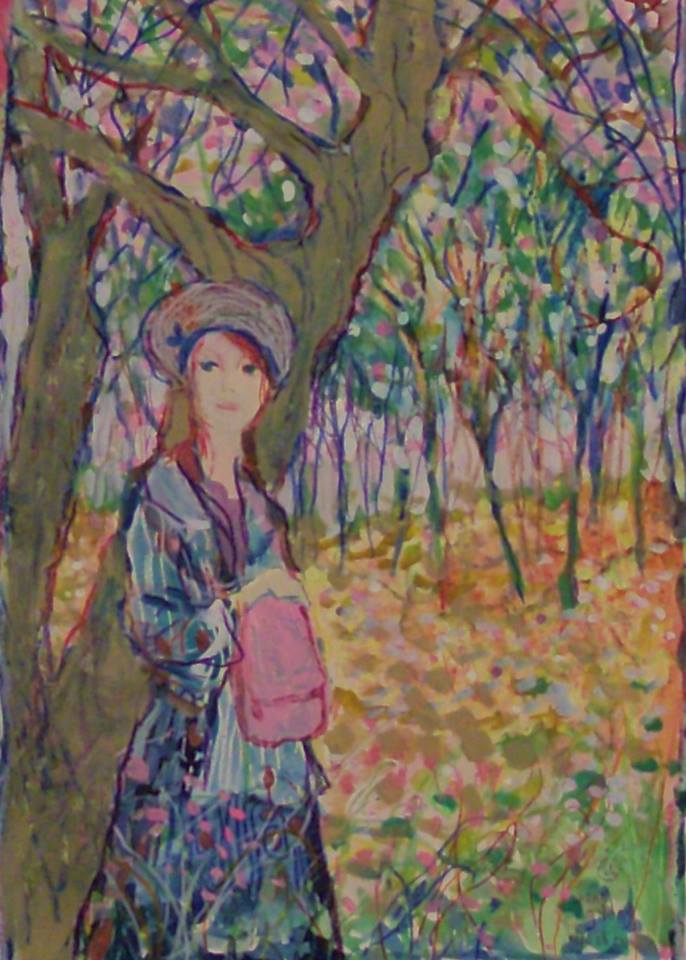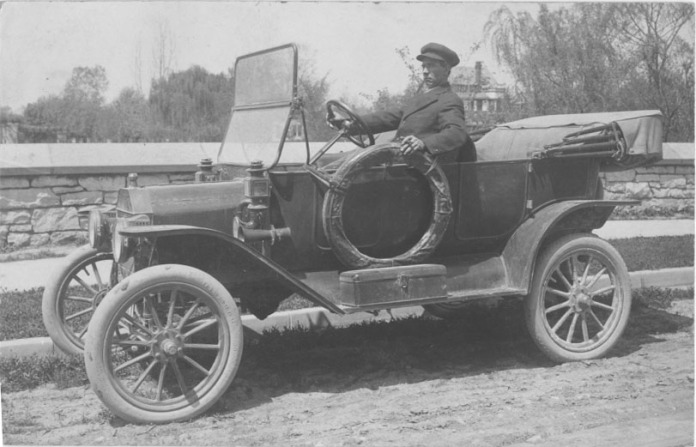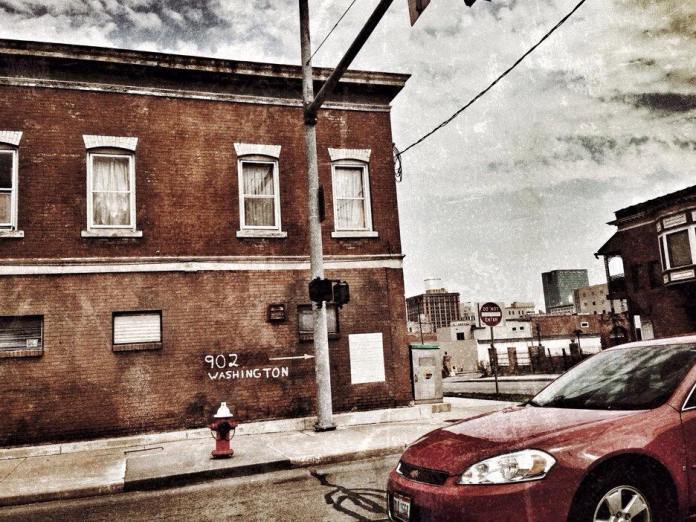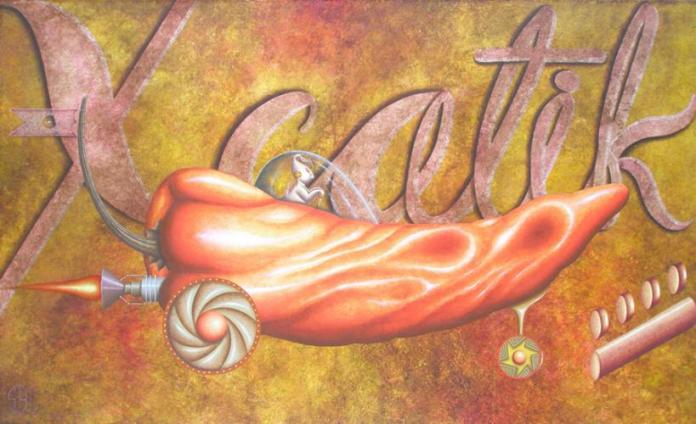by Bill Meissner
Each step should be precise and tight and complete, he thinks,
the sides of the foot cupped around the wire as you walk the toward
the middle. Each step should be graceful and exact, and so
silent that you can hear the gasps of the crowd below, a sound
like fluttering wings.
The dream fades from Chance’s mind. He finds himself in a
circus museum, staring through a glass display case. Inside it is
the wrist watch Karl Wallenda wore when he fell to his death.
“Look,” he says to the woman he loves, who tours the museum with
him on their weekend getaway, “It’s Wallenda’s watch.” But
when he turns toward her, he sees that she has walked further down
the display and doesn’t hear him above the off-key circus music
piped through the overhead speakers. “Look,” he says again, but
she’s already turned the corner and entered another room of the
display. It bothers him lately that, he never seems to speak to
her at the right time, and that she never seems to hear him.
For the past couple of years, Chance has had the recurring
dream of walking a tightrope, a silver wire strung over a dark
canyon. In the dream, he’s standing on the brightly painted red and
yellow plywood platform, concentrating on the wire that’s perfectly motionless,
like a silver crack in the sky. He places his first shivering
bare foot on it and leans his weight forward. He knows the crowd
is down there, their upturned faces like pebbles at the bottom of a
clear stream, but he doesn’t look at them. He follows with his
left foot, and he lets go of the support ropes on the platform as
drops of sweat burn his eyes. Before he knows it, he’s halfway
across, staring straight ahead as he knows he must, the soles of
his feet finding the wire ahead of him. In the dream, he always
thinks how it’s easier than he thought it would be—this being
halfway. He’s an artist now, and it’s a slow, graceful float over
the canyon below, as if he were a bird, gliding. Before he
realizes it, he’s almost to the gray platform on the other side.
That’s when the wire begins to waver, as if there’s an earthquake,
as if the whole earth is shifting its weight left, then right, then
left.
At that moment the wire suddenly widens and flattens and
Chance wakes in a bed next to the woman he loves, and he feels the
sweat on his face, the adrenalin making his heart squeeze hard like
a fist grasping to hold on to something.
He always wakes at that moment when the wire wavers.
He never knows if he falls, or if he makes those final
steps onto the other platform, never has the chance to hear
the applause from the tense audience, gathered below at the edges
of the canyon. He sits up in a bed that’s still and solid and
unmoving. And when he leans over and kisses her, it finally brings
him back to pure, sweet consciousness.
* * *
One night, when he woke from his dream, his kiss woke her.
“Why did you kiss me?” Grace whispered.
“So I know I’m not falling,” he said.
“Falling?” she said, her sleepy voice becoming more practical.
“Why would you be falling?”
He never answered her question, didn’t really how to respond.
After all, he’s never told her about this recurring dream; he just
keeps the falling inside himself, where it belongs.
* * *
Today, in the museum, Chance stares through the glass case at the
pictures of The Flying Wallendas, sees them on bicycles on the wire, sees
the famous seven-person chair pyramid, a tight-rope act which they performed
without a net. The pyramid collapsed one day, dropping several
of the family members to their deaths. He cringes when he reads
the placard which describes the accident. Chance wonders a lot lately
about life’s straight lines that seem to lead you forward, and the
way you have to balance to stay on. He tries not to think about
falling off. He is always honest with himself except when it comes
to the falling.
The placard describes how Karl Wallenda—known as The
Great Wallenda—was injured in the incident and,
and, after recuperating, got back on the high wire again.
All the survivors stepped back on the wire again to perform
more circus shows. What must have been going through their minds
when they climbed back onto that wooden platform and touched their
toe to the wire again? Chance wonders. They couldn’t have allowed
their minds any image of that deadly fall. All they could possibly
think was toe to wire, next step, next step. That’s the only way
to approach it, he thought: one step after the other, shoulders
arched back proudly. Never a thought of the darkness below.
Confidence was their only net.
At the front of the display case is the watch worn by The
Great Wallenda at the time of his death. Chance can hardly get
himself to study it, but he forces himself: It’s a simple watch,
with a plain black leather wristband and a small, delicate silver
watchface. Chance is amazed that the crystal of the watch is not
cracked or broken. The placard tells that Karl, at age 73, walked between
two ten-story buildings in Puerto Rico when a sudden gust of wind
caused the wire to sway. He was holding his balance pole, but that
didn’t help—the pole suddenly tilted to one side, pulling him, and he fell.
Chance pictures the moment: Karl’s outstretched fingertips
reaching for a wire which might as well have been a thousand miles
away.
He wonders: What went through Karl’s mind as he fell to the
pavement 121 feet below? Did he close his eyes? Did he
concentrate with all his powers, trying to transform solid concrete
into a layer of sponge? Did he hear someone in the audience call out to him,
a soft voice, as if to break his fall? Or did he simply accept
that this was his fate: to be destroyed by what he loved most, and
to know that if he had the chance to live his life again, he would
climb back on that wire. He would climb back on it again and
again. He would do what he loved, no matter if his fragile bones
shattered a thousand times.
The hands of Wallenda’s watch read ten after twelve. As he stares
at it, Chance wonders: did the watch stop at ten after twelve, exactly
at the moment when the pavement rushed up to meet Karl? Or did it
keep running for a while, pulling Karl’s spirit into the future for
a few minutes or hours before it finally wound down?
Chance’s mind races—he wants to ask Grace these questions,
he wants to tell her his dream, but she’s already walked further
along the circus displays and has turned the corner into the next
room. As he walks down the narrow, picture-lined hallway to look
for her, he finds himself placing one foot in front of the other,
delicately, along a seam in the concrete floor.
When he turns the corner, she’s there, standing in front of a
brightly painted red and yellow circus wagon. She looks up at him,
her eyes large, blue, two pools of sky.
“What’s wrong, Chance?” she asks, her voice melodic. “You
look pale, like something terrible happened.”
“It did,” he says. “The Great Wallenda died. He fell from
the wire and was killed.”
A puzzled look washes across her face. She puts her hand on
his shoulder. “I know that,” she says. “But that was a long time
ago. You say it like it just happened.”
He looks down at his feet and sighs. “I feel like it just
did. ”
He looks into her eyes and he wants to say more. She’s always
so certain about her career in business, confident about her life, her
direction, thinks Chance. He wishes he could explain everything
to her, but just like the Great Wallenda couldn’t find the wire as
he fell, he can’t find the right words.
* * *
Back at the motel, he tosses in the bed for a long time,
unable to sleep. He looks at his wrist, notices that he forgot to
take his watch off before bed. He stares at the face of the watch,
its faintly glowing hands already past two a.m..
He knows he might have the dream again when he falls asleep,
knows he might be taking those steps across the middle of the tightrope,
that, even though it’s only a few yards long, will seem to stretch into
infinity. One foot in front of the other with exact gracefulness,
and, when he approaches the far platform, everything will begin to
waver. Knows that he’ll suddenly look clumsy up there, not an
artist at all—his whole body wobbling like a top that’s lost its
spin, knows that the darkness might rise up from the canyon to
swallow him and that he’ll feel no balance, no balance at all.
But right now that doesn’t matter. Right now what matters is
that he’s close to the woman he loves. He slides his arms around
her, and kisses her cheek. She jolts slightly, as if waking.
“I was dreaming…” she whispers, her voice sounding suddenly
frail.
“Dreaming what?”
“I dreamt I was in the middle of a tightrope wire. It must
have been the museum. And what you said about Wallenda.” She
pulls back from him a moment and he sees, for the first time, a
fear, a doubt behind the beautiful, unbreakable bones of her face.
He hates to see that look on her face, but he loves her for it, too.
She clicks on the lamp, sits up in bed and seems to shiver.
He notices, for the first time, a slight tint of gray on the side
of her hair.
“Don’t worry,” he tries to assure her. “It was just a dream.”
He thinks maybe this is the time to tell her about his dream, about
the strange coincidence of common dreams, but then he decides that
maybe it would upset her more. So he keeps quiet about it. Maybe
he’ll tell her first thing in the morning, or on their long drive
home. The words will rush out, and he’ll tell her about Karl
Wallenda’s watch, and how far he fell, and how the crystal wasn’t
even shattered. And maybe she’ll tell him her worries, too, her
wavering. Maybe she’ll admit that her life, which always seemed
to stretch so far out in front of her when she was young, doesn’t
seem so endless any more. Maybe they’ll tell each other that
there’s no holding still, there’s no guarantee that, once they
reach the great middle, they won’t lose their balance and fall.
He clicks off the light, touches her hand and they embrace
across the canyon of the bed. He feels her breath on his sweating
neck, feels her thoughts intertwine with his like a strong, tight
cord, feels the tingle of static electricity in her skin.
He hears his voice, her voice calling out from a distance, as
if they were watching someone falling, or as if they themselves
were falling.
She sits up suddenly and says, “Talk to me.”
“About what?” he asks.
“Anything,” she sighs. “Just talk to me.”
For a few seconds, he doesn’t say a word, just closes his
eyes. It occurs to him that now, right now, is the time to talk
about everything. He pulls her tightly to him and feels her hands,
like nets, pulling him at the same moment. They balance there together,
as if it will always be this way between them: catching each other,
then falling, then catching each other again.
* * * * * * * * * * * *
Bill Meissner’s first novel, SPIRITS IN THE GRASS, about a small town ballplayer who finds the remains of an ancient Native American burial ground on a baseball field, was published in 2008 by the University of Notre Dame Press and won the Midwest Book Award. The book is available as an ebook from the UND Press. Meissner’s two books of short stories are THE ROAD TO COSMOS, [University of Notre Dame Press, 2006] and HITTING INTO THE WIND [Random House/SMU Press, Dzanc Books ebook].
Meissner has also published four books of poems: AMERICAN COMPASS, [U. of Notre Dame Press], LEARNING TO BREATHE UNDERWATER and THE SLEEPWALKER’S SON [both from Ohio U. Press], and TWIN SONS OF DIFFERENT MIRRORS [Milkweed Editions].
“Karl Wallenda’s Watch” is included in Meissner’s newly-released chapbook of stories and poems, THE GLASS CARNIVAL, published by Paper Soul Press, Pittsburgh, Pa. [papersoulpress@gmail.com].
He is director of creative writing at St. CloudStateUniversity in Minnesota. His web page is: http://web.stcloudstate.edu/wjmeissner/
His Facebook author page is:
http://www.facebook.com/mobileprotection#!/pages/Bill-Meissner/174769532541232?sk=info
Three of Meissner’s poems and a trailer for SPIRITS IN THE GRASS are on youtube, accompanied by images and music.
* * * * * * * * * * * * *
 detail from Merida Daytime by Samuel Barrera
detail from Merida Daytime by Samuel Barrera







